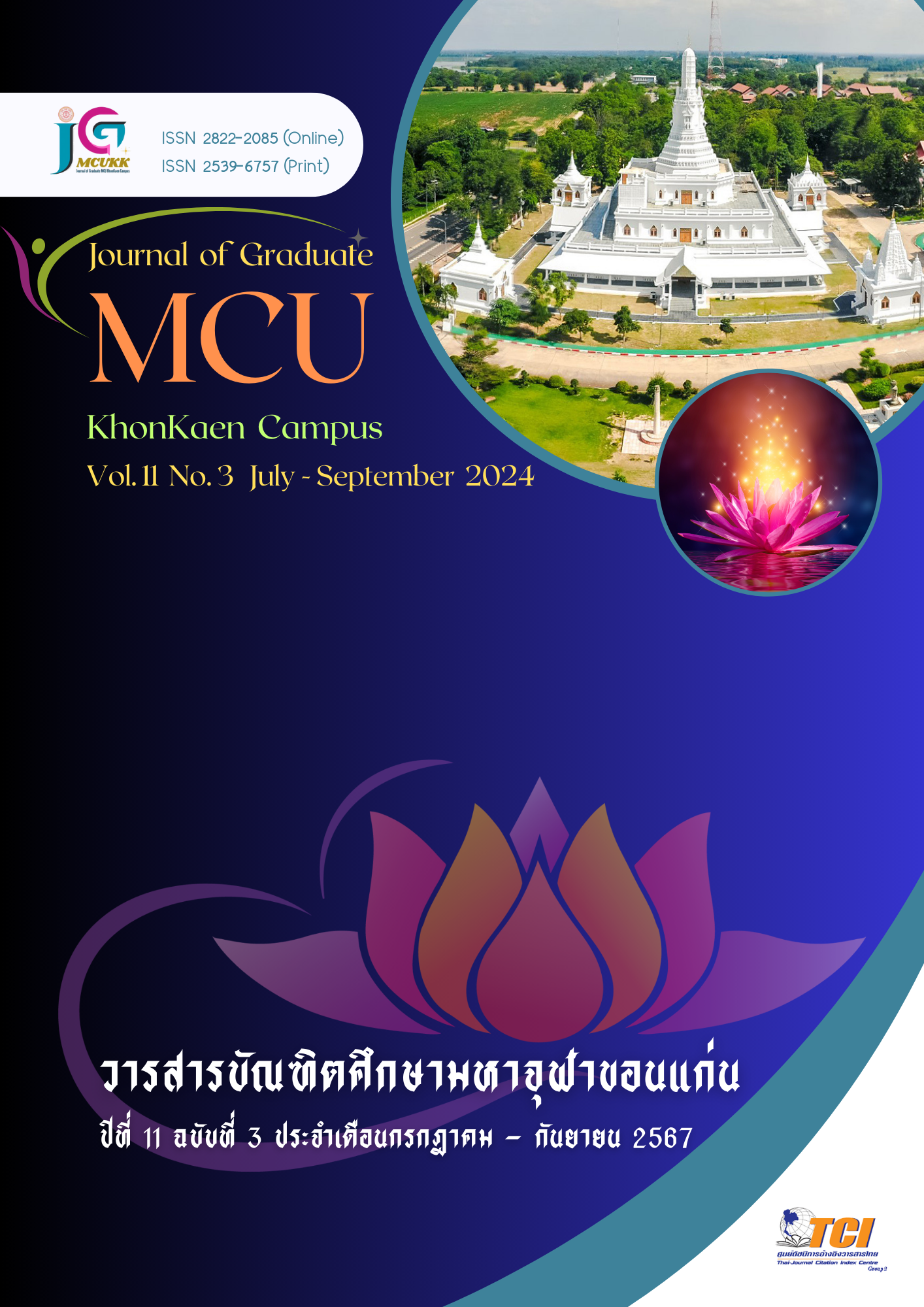The Development of Educational Supervision Guidelines using the Four Sangahavatthu Principles for Educational Institutions under the Khon Kaen Secondary Educational Service Area Office
Main Article Content
Abstract
The objectives of this research are: 1. To study the current and desired conditions of educational supervision. 2. To develop guidelines for educational supervision using the Four Principles of Sangahavatthu for educational institutions under the jurisdiction of the Secondary Education Service Area Office, Khon Kaen. The study used a mixed-methods approach, with a sample group of 342 participants, including educational administrators, school administrators, supervisors, and teachers. The research instruments included questionnaires assessing the current and desired state of educational supervision and evaluation of the developed guidelines. Data analysis involved quantitative analysis using percentage, mean, and standard deviation, and qualitative analysis using content analysis.
The research results were as follows:
1. The current state of educational supervision had an overall mean score at a low level ( x = 2.92) In contrast, the desired state had an overall mean score at the highest level ( x = 4.90) indicating that all respondents desired an educational supervision approach using the Four Sagahavatthu Principles that could be applied in schools under the Khon Kaen Secondary Educational Service Area Office, in a concrete and comprehensive manner.
2. The educational supervision guidelines based on the Four Sangahavatthu Principles for schools in Khon Kaen consist of four key steps: planning supervision, implementing supervision, observing the results, and reflecting on supervision. The overall evaluation of the appropriateness of these guidelines was at the highest level. Data analysis indicated that the supervision guidelines based on the Four Sangahavatthu Principles for educational institutions under the Khon Kaen Secondary Educational Service Area Office are of high quality and can be used as a guide for effective educational supervision operations.
Article Details

This work is licensed under a Creative Commons Attribution-NonCommercial-NoDerivatives 4.0 International License.
References
กนกอร สมปราชญ์. (2562). ภาวะผู้นำกับคุณภาพสถานศึกษา. ขอนแก่น: มหาวิทยาลัยขอนแก่น.
กลุ่มนิเทศ ติดตาม และประเมินผลการจัดการศึกษา สำนักงานเขตพื้นที่การศึกษามัธยมศึกษาขอนแก่น. (2566). คู่มือการนิเทศบูรณาการโดยใช้พื้นที่เป็นฐานเพื่อพัฒนาคุณภาพการศึกษา. ขอนแก่น: สำนักงานเขตพื้นที่การศึกษามัธยมศึกษาขอนแก่น.
จักรวาล สุขไมตรี. (2562). การบริหารงานตามหลักสังคหวัตถุ 4 ขององค์การบริหารส่วนตำบลพะตง อำเภอหาดใหญ่ จังหวัดสงขลา. วารสารราชพฤกษ์, 17(2), 105-111.
ดาวรุวรรณ ถวิลการ. (2562). ศาสตร์และศิลป์ทางการบริหารการศึกษา. ขอนแก่น: มหาวิทยาลัยขอนแก่น.
นภา ชาลี, พระครูปลัดสมชัย นิสฺสโภ และ พระมหาสุภวิชญ์ ปภสฺสโร. (2565). การบริหารสถานศึกษาตามหลักสังคหวัตถุ 4 ของผู้บริหารสถานศึกษาขั้นพื้นฐาน สังกัดสำนักงานเขตพื้นที่การศึกษา ประถมศึกษาเลย เขต 2. วารสาร มจร อุบลปริทรรศน์, 7(2), 2241-2250.
ภัณทิรา สุปการ. (2557). รูปแบบการบริหารจัดการนิเทศการศึกษา สำหรับศตวรรษที่ 21. (วิทยานิพนธ์ปรัชญาดุษฎีบัณฑิต สาขาวิชาการบริหารการศึกษา). บัณฑิตวิทยาลัย: มหาวิทยาลัยศิลปากร.
เสาวนี สิริสุขศิลป์. (2564). ภาวะผู้นำทางการนิเทศการศึกษา. (พิมพ์ครั้งที่ 2). ขอนแก่น: มหาวิทยาลัยขอนแก่น.
อัญชลี โพธิ์ทอง. (2549). นิเทศการศึกษา. กรุงเทพฯ: มหาวิทยาลัยรามคำแหง.
Alkrdem, M. (2011). School-Based Instructional Supervision in Saudi Arabian Public Secondary Schools. Dissertation Abstracts International, 70(99) 3836-A.
Deming, E.W. (1990). Sample Design in Business Research. New York: John Wiley & Sons.
MemduhoGLu, H. B. (2012). The Issue of Education Supervision in Turkey in the Views of Teachers, Administrators, Supervisors and Lecturers. Educational Sciences: Theory and Practice, 12(1), 149.
Yavuz, M. (2010). Effectiveness of Supervisions Conducted by Primary Education Supervisors According to School Principals. Evaluations, 103, 371-378.

